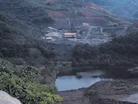AngloGold Ashanti expects gold production at Obuasi to begin by year end

AngloGold Ashanti has announced the Obuasi Redevelopment Project in Ghana is on track to pour its first gold by the end of the year.
Underground development blasting has begun. The first blast, at about 7pm on Friday, February 1, advanced development by around 4.2 metres on the 2,700 level, which is accessed through the Obuasi Deeps Decline from surface, and is just over 700 metres vertically below the decline portal. Benching and a number of additional face blasts have taken place since then, with more than 14m of advance recorded.
AngloGold Ashanti, Chief Executive Officer, Kelvin Dushnisky commented: “The first blast was a significant milestone in transforming this important mine into a modern, productive operation. Our investment in Obuasi Gold mine’s redevelopment will ultimately make this a key asset for Ghana, and for AngloGold Ashanti’s portfolio, for the long term.”
Related stories:
Barminco extends Anglogold Ashanti Sunrise Dam contract for $700 million
AngloGold Ashanti appoints new CEO
AngloGold Ashanti receives environmental permits for Obuasi Gold mine redevelopment
AngloGold Ashanti announced early last year it would invest $495m to $545m to recapitalise the iconic mine in Ghana, to develop its six million ounces of high-grade reserve. The project will see Obuasi transformed into a modern, mechanised mine that will produce an average 350,000oz to 400,000oz a year, at all-in sustaining costs of $725/oz to $825/oz, during the mine’s first decade of operation.
Higher grades in the second decade of operation will see production improve further. The project remains on track to produce its first gold by the end of this year, with ramp-up expected during 2020.
AngloGold Ashanti has committed to ensuring significant local content in the mine’s development and operation, through employment at all levels and procurement, notably through the creation of a joint venture between Australia’s AUMS and Ghana’s Rocksure, to undertake Ghana’s underground mining contract.
Development of the project is progressing as planned, and it is expected that capacity will ramp up to around a kilometre of linear advancement per month in the second half of the year. Stoping operations are expected to start in the fourth quarter of this year, as new production areas are accessed.



